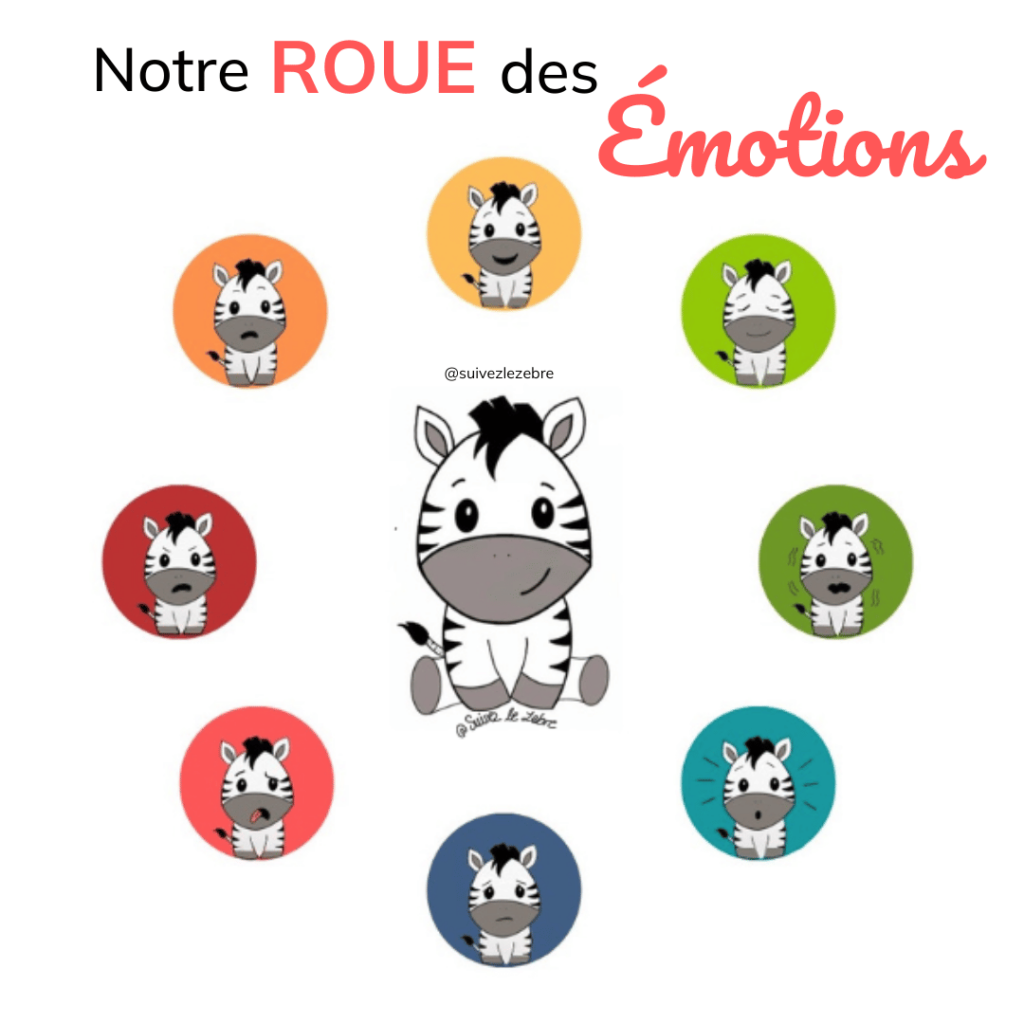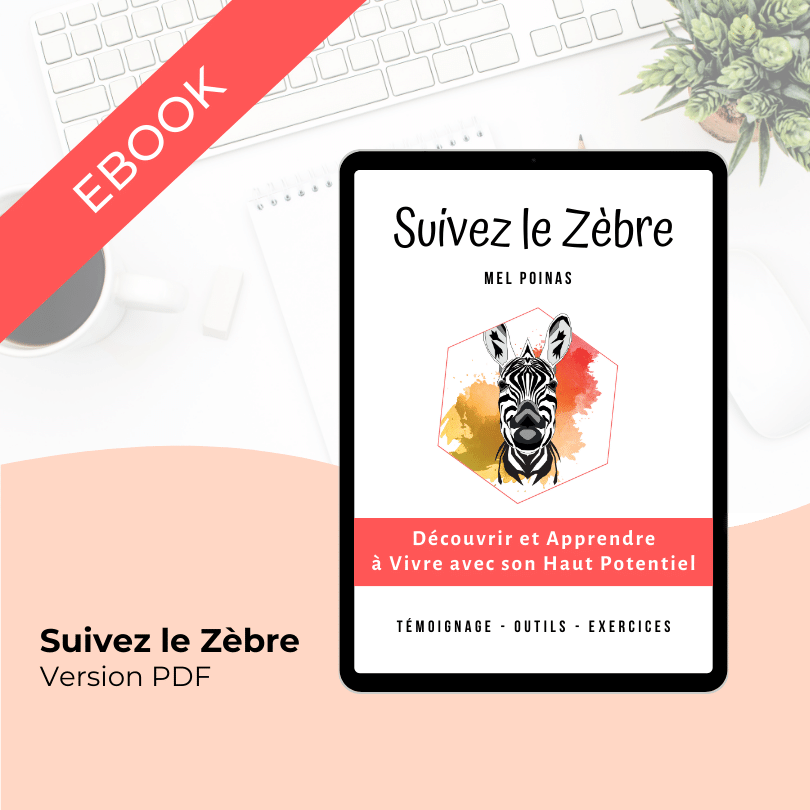Article updated February 9, 2023
Mel, the blog’s founder discovered her giftedness in 2017. During this discovery, she realized that what was sometimes more complicated in her daily life was not her brain, which was working at a thousand miles an hour, but rather her hypersensitivity.
Since then, hypersensitivity has been at the heart of the subjects addressed by Suivez le Zèbre. In this article, we share Mel’s tips and tricks with you, as well as those of Fanny Marais, a personal development coach specializing in neuroatypical profiles and founder of the Observatoire de la Haute Sensibilité alongside Saverio Tomnasella and Elodie Crépel.
Until I discovered my giftedness, I thought I was too hypersensitive or too emotional and I didn’t understand where it was coming from.Discovering that I was gifted helped me to calm down and live better with my hypersensitivity.
Mel POINAS
When you’re gifted and hypersensitive, you share this sensitivity, you take everything to heart and, above all, you need meaning, logic and justice on a daily basis.
A quick reminder: what is hypersensitivity?
Hypersensitivity is a term used to describe an over-reaction or intense response to a stimulus, whether physical, emotional or environmental.

This response is subjective and intrinsic to the individual. It varies considerably from person to person. People who are considered hypersensitive may experience symptoms such as fatigue, headaches, anxiety or depression, increased sensitivity to pain or light, among others.
Definition of hypersensitivity according to the Larousse dictionary:
- Sensitivity exaggerated or extreme.
- Defense reaction of certain plants against a parasite, characterized by necrosis of attacked cells and protection of neighboring tissues.
- A condition in which an organism overreacts to the introduction of an antigen. (Allergy is a form of hypersensitivity).
The first Larousse definition is a bit clumsy. At Suivez le Zèbre, we prefer to refer to High Potential profiles as having intense, exacerbated, developed or high sensitivity.
According to Wikipedia,hypersensitivity is a higher-than-average sensitivity, either temporarily or permanently, that can be experienced with difficulty by the person themselves, or perceived as “exaggerated” or even “extreme” by those around them.
By the way, if you find yourself in these descriptions, don’t hesitate to take our test. You’ll be asked to make a symbolic contribution by offering the team a coffee (1 coffee = 1 euro).

According to research by psychologists and psycho-clinicians, the ” highly sensitive individuals ” represent around 15 to 25 % of the population. The characteristics of all of this come out from a greater reactivity to the same stimulus, which has positive aspects – Jung speaks of ” enriching character ” – and negative aspects, such as increased sensitivity to fear.
Hypersensitivity: A much higher intensity
Hypersensitivity is a stronger, more intense, more developed reaction. The way a neuroatypical’s brain works makes his senses sharper, which explains this hypersensitivity. Because they feel things more deeply, they react more intensely to the stimuli around them. Relentless logic….
It is important not to deny one’s emotions but rather to recognize them. To help you accept themit’s essential to identify what triggers intense emotions in you?
Would you like to know if you could be hypersensitive? Don’t hesitate to take our test. You’ll be asked to make a symbolic contribution by offering the team a coffee (1coffee = 1 euro).
If you’re feeling an emotion related to something uncool, you’ll be very intensely sad, frustrated, uncomfortable or angry but if you are stimulated in a positive way then the happiness you feel is just magical ! For feel great happinessyou also need to experience great sadness.
Mel POINAS
Giftedness, Hypersensitivity and emotions, how does it work?
Speaking of joy and sadness, can we learn to manage our hypersensitivity without talking about emotions?

The judgment of others on emotion and hypersensitivity
In our modern societies, Emotion is almost always misunderstood, as is hypersensitivity… As if the famous “she’s too emotional” or “she’s hypersensitive” were a flaw or a weakness. As we can see from the definitions in the Larousse dictionary, the French language contributes to the transmission of stereotypes and preconceived ideas.
Our tips for managing your hypersensitivity
Hypersensitivity can be difficult to manage on a daily basis, but there are ways to learn to better manage your emotions and reactions. If you’re hypersensitive, here are a few tips that might help.
1- Understanding hypersensitivity
The first step to managing hypersensitivity is to understand what it is. As a reminder: hypersensitivity is heightened sensitivity to stimuli, which can lead to intense emotional reactions and increased vulnerability to stress.
2- Taking care of yourself
Taking care of yourself is crucial to manage your hypersensitivity. This includes giving yourself enough time to rest and relax, eating healthily and exercising regularly. It’s also important to do activities that you enjoy, and to surround yourself with positive people who help you feel good in your daily life.
3- Learning to manage stress
Stress can be triggered by many things for hypersensitive people, so it’s important to learn how to manage stress effectively. Techniques such as meditation, deep breathing and yoga can help manage stress.
4- Implement frustration and anger management strategies
Hypersensitive people can easily become angry or frustrated, so it’s important to put strategies in place to manage these emotions. This can include relaxation techniques, practicing assertiveness or participating in support groups.
5- Tailor-made therapy with a group of practitioners
If you’re having trouble managing your hypersensitivity, it can be helpful to work with one or more therapists. Several types of practitioners can help you understand your emotions and implement strategies to better manage your hypersensitivity:
- psychologist
- art therapist
- reflexologist
- acupuncturist
- sports coach
- dietician
- naturopath
- sophrologist
- personal development coach
- etc
You can discover our articles dedicated to personal development resources here:
It is important not to deny one’s emotions but rather to recognize them. To help you accept themit’s essential to identify what triggers intense emotions in you?
You can find all of Mel’s tips, to get off the beaten path in her book Suivez le Zèbre. She shares her “home-made” solutions with you tested and approved to help me cope with the wide range of my emotions on a daily basis. If you like our articles, don’t hesitate to subscribe to our newsletter.

Le livre
Écrit par une HPI !
Un témoignage et des solutions concrètes pour découvrir, comprendre et apprendre à vivre en étant HPI.



Take advantage of the innovations of our time
If you’re hypersensitive, try to create a daily routine that suits your atypical nature. To avoid crowds, noise and stress, you can :
- do your food shopping at the drive
- order the rest online
- look at the number of visitors to places via google
- visit small local shops and producers
- move to the countryside or mountains where there are fewer people




Do everything in your power to avoid being too often in the red of the emotions gauge! If you feel that the situation is going to degenerate, withdrawing and isolating yourself is sometimes the best solution. You can then prepare yourself with tools like non-violent communication to express your feelings in a constructive way. And let’s face it, sometimes losing your temper is good for you too! So if you can’t let go, just let your emotions flow.
Pitfalls to avoid when you are gifted & hypersensitive
When you’re hypersensitive, it’s very important to understand what triggers your emotions. As gifted and hypersensitive people, when a situation puts us in “emotional danger”, we have two solutions:
– communication and dialogue to calm the situation and calm ourselves, to avoid blocking and activating the little bike mode that goes round and round in our heads.
– if dialogue isn’t possible, because you’re over-emotional or the other person isn’t in a position to dialogue with you, take a step back and come back to the situation coldly, so you do not get stuck in it.
Analyze the situations that trigger emotional overload in you and try to find the source of the trigger. To calm down, it’s essential to make the link between emotions and the past.
Our solutions to help you manage your emotions.
We recommend all activities related to relaxation and what can “calm” and “rest” our brain:
– Meditation
– Sophrology
– Massage
– Walk
– Reading
– Manual work of all kinds
– Resting, sleeping, napping
– Taking time for yourself
– Learning to say No
– interesting in personal development and mindfulness
– Accepting to be different and to be perceived as different (but in fact, we all are, since the norm doesn’t exist).
– Accepting anxiety and stress, and finding ways to relax during moments of panic
– Reassure ourselves by doing things that comfort us
You can be hypersensitive without being gifted. You can be emotional without being gifted. Is a gifted person necessarily hypersensitive? At Suivez le Zèbre, we think so, but we know that neuropsychologists disagree on this point. To date, there are no conclusive studies on either side, so let’s be patient!
Conclusion: Giftedness, hypersensitivity and emotion management
Being Gifted means being both emotional and sensitive. Dealing with hypersensitivity can be difficult, but it is possible. By understanding what hypersensitivity is, taking care of yourself, learning to manage stress, implementing strategies to avoid situations of conflict, frustration and emotional overload.
Once you’ve tamed your emotions and mastered the cursor on the emotions gauge, you’ll be able to measure them out and appreciate their different levels. Enjoy this magnificent palette of emotions at your disposal!
To go further, you can read
- Is a gifted person necessarily hypersensitive?
- HEP, High Emotional Potential
- The difference between Giftedness and HEP
- Zebra or Hypersensitive, HPE, Asperger’s, Bipolar, Borderline?
- The best books about High Learning Potential
- Giftedness : 20 characteristics of complex and laminar profiles















